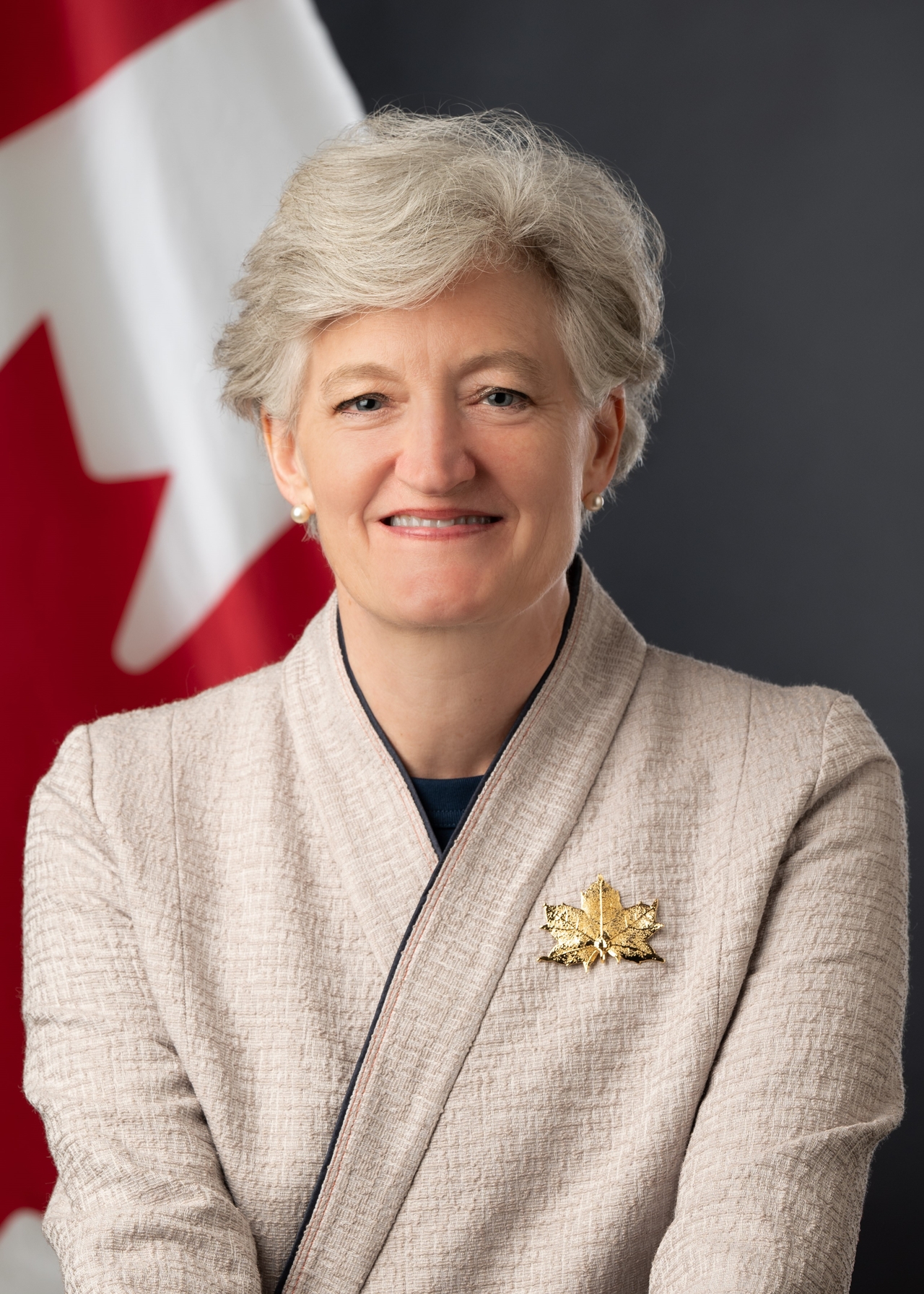
Q. What challenges have you faced as a female ambassador, and how have you overcome them? Do you believe female representation in diplomacy and politics has improved globally?
The major challenges I have faced have, like many other senior managers and executives, come trying to balance obligations at home and in the professional context. This is where societal changes, for all of us, are most needed in terms of sharing our caregiving responsibilities and roles.
This relates to raising children but also caring for aging parents as well as supporting friends, managing volunteer roles, and etc. Every person’s situation is different but as a Canadian public civil servant, I have very much welcomed – and benefitted from - legislative changes in support of parental leave and other leave options in order to better align professional development with personal fulfillment. I took a year’s maternity leave when my twin sons were born and returned to work a year later.
The data shows increasing representation of women in diplomacy and politics but there also remains progress to be made! Every year I look forward to celebrating “Women in Diplomacy Day” on June 24 which gives us an opportunity to celebrate our successes and measure the continuing gaps.
In Canada, we are very proud that 50 percent of our Heads of Mission globally are women – but we have to keep working on other data points as well. The key mantra remains: “You cannot be what you cannot see." So efforts to support inclusion, in all professions, remain very important. This is relevant to gender representation but also inclusion of many other groups, such as minorities and disabled groups. In Canada we are also reflecting on how to improve representation of indigenous groups in education, in business and so on.
Q. What policies or social campaigns have been promoted in your country to improve women’s rights and leadership?
Thank you for that important question. In Canada, we have implemented several key policies and initiatives aimed at improving women’s rights and leadership, and I’d like to highlight several particularly impactful examples.
First, we rely increasingly on Gender-Based Analysis Plus, or GBA+. This innovative tool is designed to ensure that all government policies and programs are assessed through a gender lens. It analyzes how diverse groups within Canada, including young women, may experience these initiatives differently and address the unique needs of these marginalized communities.
As of 2024, over 80 percent of federal departments in Canada have integrated GBA+ into their policy-making processes with a number of success stories. GBA+ has enabled the Government of Canada to better develop programs and policies that promote equitable access to opportunities and resources but also foster an environment where women can thrive as leaders in all sectors of society.
One good example of this is the development of the Women Entrepreneurship Strategy, which can be largely credited with being driven from a GBA+ lens. The WES is a comprehensive initiative aimed at increasing women’s participation in entrepreneurship. Through this strategy, we provide access to funding, mentorship, and training programs specifically tailored for women entrepreneurs. Since its inception in 2018, the WES has supported over 10,000 women to start new businesses and has helped more than an additional 12,000 grow their existing ones.
We cannot forget about the Canadian civil society organizations that are contributing to the WES by empowering women into leadership roles within the business community. For example, Women Business Enterprises Canada (WBE Canada) promotes women's leadership in business by certifying women-owned businesses and connecting them with corporate and government buyers. They do this through a variety of innovative ways, including events, workshops, etc., but most impressively, they also conduct research to identify, address and remove barriers faced by women-owned businesses in order to promote women’s meaningful and lasting success in the broader business community.
In conjunction with these tailored initiatives, we also observe Gender Equality Week annually in the third week of September. During this week, the Government of Canada promotes various social campaigns that encourage public dialogue around women's rights, leadership opportunities, and the importance of fostering an inclusive society. In 2024, the theme was “Unlocking Potential: Economic Power Through Gender Equality” to provoke critical discussions on how gender equality is essential for a thriving and equitable society. By all accounts, the campaign was a resounding success given the broad participation across our provinces and territories, including through public service announcements, community events, and partnerships with women's organizations.
Add all of these initiatives together and I think I can proudly say that Canada is serious about its commitment to create a more inclusive and equitable society. We believe that when women are empowered and represented as leaders, it benefits not only individuals but also our communities and our country as a whole.
Q. What advice would you give to young women aspiring to leadership positions, especially in international relations?
It is very important to build flexibility and agility so as to be able to take up surprising or unexpected opportunities. Career planning is difficult in all walks of life – but it is especially challenging in an international and “rotational” environment when considering career opportunities in different countries and different organizations. So, it is important to have an open mind and to have ambition: don’t rule yourself out. Or to paraphrase Winston Churchill, let the difficulties argue for themselves. Focus instead on the possibilities! The phrase “lean in” is over-used but for good reason. Imagine yourself in the next position up and work towards developing the competencies that could put you in that next level.
Finally, for anyone working in the international sphere, it is very important to build language skills. It is important to be able to communicate well in one’s mother tongue. It is equally important to be able to communicate in other languages. This really supports an international career. For example, I often say that my ability to speak French changed my life and the course of my career.
Q. There are growing concerns that AI gender bias reflects both technological limitations and deep-rooted societal prejudices. Despite economic and technological advancements, what measures do you believe are necessary to bridge the gender gap both online and offline?
This is an important question and one that I think we all will have to continue to grapple with for the years to come. AI has the potential to revolutionize our lives, but we need to be deliberate in its adoption to ensure all persons benefit from these changes. To that end, you can categorize Canada’s approach to this issue into three parts.
We first have to focus on who is actually developing this new technology. That means we need to incorporate women and underrepresented groups from the beginning. Their inclusion not only brings diverse perspectives to the table but also helps to identify and mitigate biases in AI systems from the outset.
We’re doing this by focusing on post graduate education, through programs like our Digital Skills for Youth Program. The initiative aims to provide practical job placement opportunities to over 10,000 young female post-secondary in partnership with leading small and medium-tech firms. By providing training and mentorship opportunities, this program empowers young women to pursue careers in technology, thereby increasing their representation in a field that has traditionally been very accommodating for women or other marginalized communities.
Second – we can prevent entrenched biases from being perpetuated by new AI technologies through voluntary guidelines and responsible regulatory frameworks. Within our federal government, we are taking proactive steps with the Directive on Automated Decision-Making. This directive mandates that all new technologies which will rely on AI need to assess the potential impacts of automated systems on fairness, transparency, and bias.
By implementing such guidelines, Canada is not only setting a standard for ethical AI use but also encouraging tech companies to adopt similar practices. This regulatory approach helps to safeguard against the perpetuation of gender bias in AI and ensures that all individuals are treated fairly in digital environments.
The third part of Canada’s strategy focuses on public engagement and education by reinforcing the importance on the responsible use of AI technologies to foster a more inclusive digital landscape. One such effort by Canada was an initiative called “Learning Together for Responsible Artificial Intelligence” whereby Canadians were invited to several national surveys and virtual workshops to discuss AI’s impact on our future society.
When asked, the majority of the participants in this initiative stated that they felt better prepared to consider the ethical dimensions surrounding the use of AI technologies, including gender biases. This shows that by engaging communities in conversations about these issues, we can cultivate a culture of accountability and drive demand for more equitable practices in both technology development and application.
Canada shares the same concerns our South Korean friends do about the inherent risks associated with AI. Yet, at the same time, if we work together to ensure our approaches are responsible and inclusive, we can set the right guardrails in place to avoid perpetuating deep societal prejudices for the benefit of all our citizens.
For a special feature to celebrate International Women's Day on March 8th, The Korea Herald met with nine female diplomatic envoys in Seoul to hear their opinions on the persistance of gender inequality, AI-driven gender biases and how women's empowerment can be fully realized. -- Ed.
koreadherald@heradcorp.com




